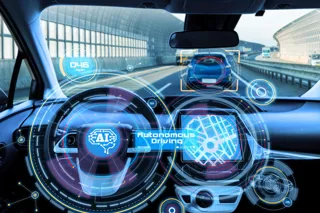Thatcham Research and Euro NCAP have assessed the latest driver assistance systems to ensure users are fully aware of their capabilities.
Reports of accidents where drivers have misused these systems are becoming a regular topic for the media and these new gradings are designed to inform drivers of the performance, and most importantly, the limitations of Assisted Driving systems.
“The systems that are currently allowed on our roads are there to assist the driver – but do not replace them,” said Matthew Avery, Thatcham’s director of research. “Unfortunately, there are motorists that believe they can purchase a self-driving car today. This is a dangerous misconception that sees too much control handed to vehicles that are not ready to cope with all situations.
“Clarity is therefore required to make sure drivers understand the capability and performance of current assisted systems. It's crucial today’s technology is adopted safely before we take the next step on the road to automation. There are safety and insurance implications that must be considered seriously.”
Ten vehicles have been initially assessed, including the Tesla Model 3, BMW 3 Series and Mercedes GLE.
The testing looked at how effective the systems control the car, how the carmaker communicates the capability and functionality of the systems and how well the car protects the driver in an emergency.
Mercedes scored the highest number of points across the three categories, with its GLE model receiving a ‘very good’ rating. The BMW 3 Series and Audi Q8 also scored top marks.
The Ford Kuga’s results showed a ‘good’ grading is possible for a mid-class vehicle, thanks to its combination of Vehicle Assistance and Safety Back-up. The entry-level Renault Clio and Peugeot 2008 offer effective systems, but lack emergency assist capability which would have boosted their grading.
The Tesla Model 3 was top scorer in the vehicle assistance and safety back-up assessments, but was the lowest scorer for driver engagement, resulting in a ‘moderate’ grading.
"The first batch of results show some car makers have developed robust assisted driving systems and that’s good to see. But there are also significant gaps in capability on other vehicles,” Avery explained.
“The Tesla Model 3 was the best for vehicle assistance and safety back-up. But lost ground for over selling what its ‘Autopilot’ system is capable of, while actively discouraging drivers from engaging when behind the wheel.
“Tesla should however be recognised for its ability to update vehicles ‘Over the Air’. Two years ago, it’s safety back up results would not have been market leading. This unique capability has seen it move the safety game on, across its whole fleet of vehicles.”
Assisted Driving Systems test results:
|
Position |
Car |
Vehicle Assistance |
Driver Engagement |
Safety Back-up |
Rating |
|
1 |
Mercedes GLE |
86 |
85 |
89 |
174 / very good |
|
2 |
BMW 3-Series |
82 |
83 |
90 |
172 / very good |
|
3 |
Audi Q8 |
83 |
78 |
84 |
162 / very good |
|
4 |
Ford Kuga |
66 |
73 |
86 |
152 / good |
|
5 |
VW Passat |
76 |
79 |
61 |
137 / moderate |
|
6 |
Tesla Model 3 |
87 |
36 |
95 |
131 / moderate |
|
7 |
Nissan Juke |
52 |
70 |
72 |
124 / moderate |
|
8 |
Volvo V60 |
71 |
78 |
49 |
120 / moderate |
|
9 |
Renault Clio |
62 |
69 |
43 |
105 / entry |
|
10 |
Peugeot 2008 |
61 |
74 |
40 |
101 / entry |
Martin Milliner, claims director at Liverpool Victoria General Insurance, said: “Assisted driving systems are not all the same and whilst they are becoming commonplace in new vehicles, they are still at an embryonic stage in terms of driver awareness and understanding. The new independent grading system from Thatcham and Euro NCAP will bust the myths around driverless cars and give UK drivers a lens through which to make informed car buying choices; hopefully leading to fewer accidents and deaths on our roads.”
























Edward Handley - 01/10/2020 12:34
The level of ignorance among drivers does not surprise me. I spend a lot of time training company car and van drivers and when I ask them about the controls they all say they are fully familiar with them. I then ask awkward questions like "what does that button do?" and "What's that for?" and 90% of the time I get the wrong answer or no answer at all. Very few know what ESP/ESC/ASR is or why they might need to turn it off, they don't use cruise control because they like to have proper control of the vehicle (?!), do not know how to set the speed limiter, don't know they can turn off the lane departure control and many of them don't even understand that putting the recirculate on can make the inside mist up. The level of ignorance of even basic controls is staggering, and almost no male ever thinks about looking at the manual. It's not just the older drivers either, even young ones assume they know it all, so given the advanced systems appearing on vehicles now the problem is bound to get worse.